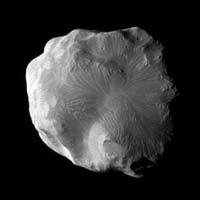|
COMETS EARTH JUPITER KUIPER BELT MARS MERCURY METEORITES NEPTUNE OORT CLOUD PLUTO SATURN SOLAR SYSTEM SPACE SUN URANUS VENUS ORDER PRINTS
PHOTO CATEGORIES SCIENCEVIEWS AMERICAN INDIAN AMPHIBIANS BIRDS BUGS FINE ART FOSSILS THE ISLANDS HISTORICAL PHOTOS MAMMALS OTHER PARKS PLANTS RELIGIOUS REPTILES SCIENCEVIEWS PRINTS
|
Related Documents
Download Options
The Cassini spacecraft imaged the surface of Saturn's moon Helene as the spacecraft flew by the moon on Jan. 31, 2011. This small moon leads Dione by 60 degrees in the moons' shared orbit. Helene is a "Trojan" moon of Dione, named for the Trojan asteroids that orbit 60 degrees ahead of and behind Jupiter as it circles the Sun. See PIA12723 for an earlier, closer view. This view looks toward the trailing hemisphere of Helene (33 kilometers, or 21 miles across). North on Helene is up and rotated 2 degrees to the left. The image was taken with the Cassini spacecraft narrow-angle camera using a combination of spectral filters sensitive to wavelengths of polarized green light centered at 617 and 568 nanometers. The view was obtained at a distance of approximately 31,000 kilometers (19,000 miles) from Helene and at a Sun-Helene-spacecraft, or phase, angle of 65 degrees. Scale in the original image was 187 meters (613 feet) per pixel. The image was contrast enhanced and magnified by a factor of 1.5 to enhance the visibility of surface features. The Cassini-Huygens mission is a cooperative project of NASA, the European Space Agency and the Italian Space Agency. The Jet Propulsion Laboratory, a division of the California Institute of Technology in Pasadena, manages the mission for NASA's Science Mission Directorate, Washington, D.C. The Cassini orbiter and its two onboard cameras were designed, developed and assembled at JPL. The imaging operations center is based at the Space Science Institute in Boulder, Colo.. |
